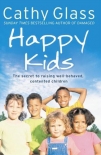Happy Kids, Cathy Glass [best ebook reader for ubuntu .TXT] 📗

- Author: Cathy Glass
Book online «Happy Kids, Cathy Glass [best ebook reader for ubuntu .TXT] 📗». Author Cathy Glass
Child overload
There are an incredible number of opportunities for children in modern-day affluent societies to learn all manner of skills and indulge in many hobbies – ballet, football, gym, ice-skating, piano, violin lessons, etc. But sometimes parents, wanting their children to be accomplished, sign them up for a ridiculously high number of activities, as well as expecting them to achieve academically. It is often the professional middle classes (with the income) who turn their children into performing seals, ferrying them every evening from one club or activity to another, with barely a breathing space in between.
I’m not saying ballet or piano lessons are going to turn your child into a juvenile delinquent, but make sure you don’t overload your child and have unattainably high goals. Clubs and activities should be fun for your child, and for your child’s personal accomplishment and pleasure, not a merit badge for you to pin to your coat to show others.
One close friend of mine, who had waited a long time to have her child, did what she thought was best by enrolling her daughter in virtually everything that was available from a very early age. As soon as the child could walk she was attending tumble tots, ballet, gym, swimming and trampoline classes, and by the time she had started school, piano, violin and trumpet lessons had been added, tucked in between various clubs and after-school activities, and home tuition in English, French and Maths. My friend genuinely believed she was giving her daughter the best start in life by providing her with all the opportunities she herself hadn’t had as a child. Rewards were given as incentives for obtaining grades and badges and passing exams; and the pressure on the child, while not obvious at the time, must have been enormous.
I remember feeling something of a failure for not providing my children with all the opportunities my friend’s daughter had, but by the age of ten her daughter was becoming very difficult and challenging in her behaviour. By the age of fourteen she had completely rebelled and was doing anything and everything that would upset or hurt her mother. She refused to go to school, got into drugs, alcohol and under-age sex, and ultimately got into trouble with the police. Having spent years on overload and under pressure to fulfil her mother’s (too high) expectations, she’d been set up for failure, as well as having had no time to simply be a child and explore her own identity. Sadly at the age of sixteen she became pregnant, and her poor mother, having hoped for so much, was left with nothing but to try to pick up the pieces and support her daughter as best she could.
The 3Rs work miracles
As ‘big fish’, children of this age tend to think they no longer need adult care and supervision, when the truth is they need it more than ever. If children at this age are left to get on with things, which their confidence and self-assurance suggests they could, they quickly become lonely, unhappy and frightened – aware of but unable to cope with the responsibility in their widening world.
I have fostered many children in this age group who hadn’t had appropriate care and supervision. They arrive loud-mouthed, and with a take-me-on-if-you-dare attitude; they are brash, verbally and, sometimes, physically aggressive, and hell bent on challenging all the boundaries and guidelines. But beneath all their bravado is a small frightened child who is crying out to be looked after and cared for. It is surprising just how quickly children like this can settle, and their behaviour be turned around. To their parents and other professionals it seems as though I have worked a miracle, so dramatic is the change in the children’s behaviour. It is no miracle, and I am no miracle worker. What I do is put in place the boundaries for good behaviour and respect, which should have been there from the start, as well as giving the children loads of love, care and attention, so that they feel safe and cherished.
If you are already using the 3Rs, then migration through this ‘big fish’ phase should be relatively painless. If not, you will need to put in place the boundaries immediately, and look at Chapter 6 on turning around a difficult child. The sooner you begin the better.
Disciplining your child’s friends
Don’t be afraid or feel embarrassed to use the 3Rs in front of, and with, your child’s friends. If, for instance, Tom is having a game of football in the garden with his mates and you have asked him and the rest of the group to play away from the flowerbeds, and they don’t, deal with it by addressing the whole group. Request – ‘Please play with the ball at the end of the garden, away from the patio and flowers. Good boys.’ If they persist, then Repeat your Request. If they continue, Reaffirm with the sanction – ‘Boys, I’m sorry, but if you can’t play with the ball at the end of the garden, you’ll have to put it away and find something else to do.’ Your child might scowl or throw you a disapproving look, but he and his friends will respect you for your authority. The alternative is that you compromise your rules whenever Tom has friends in to play, feeling uncomfortable about disciplining the whole group, which will result in your authority taking a beating every time Tom has friends in, until eventually you have to stop him having his friends in at all.
Likewise, if Claire makes a beeline for your make-up when she has a friend





Comments (0)